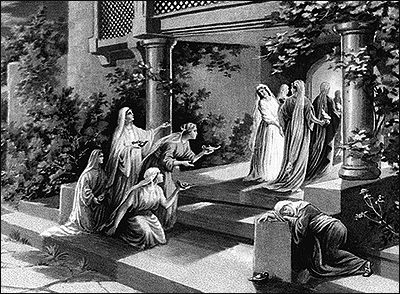
Home > Jesus > Parables of Jesus > Parable of the Ten Virgins
 Parable of the Ten Virgins
Parable of the Ten Virgins
“Then the kingdom of heaven will be comparable to ten virgins, who took their lamps and went out to meet the bridegroom. 2 Five of them were foolish, and five were prudent. 3 For when the foolish took their lamps, they took no oil with them, 4 but the prudent took oil in flasks along with their lamps. 5 Now while the bridegroom was delaying, they all got drowsy and began to sleep. 6 But at midnight there was a shout, ‘Behold, the bridegroom! Come out to meet him.’ 7 Then all those virgins rose and trimmed their lamps. 8 The foolish said to the prudent, ‘Give us some of your oil, for our lamps are going out.’ 9 But the prudent answered, ‘No, there will not be enough for us and you too; go instead to the dealers and buy some for yourselves.’ 10 And while they were going away to make the purchase, the bridegroom came, and those who were ready went in with him to the wedding feast; and the door was shut. 11 Later the other virgins also came, saying, ‘Lord, lord, open up for us.’ 12 But he answered, ‘Truly I say to you, I do not know you.’ 13 Be on the alert then, for you do not know the day nor the hour. — Matthew 25:1-13, NASB
Told by Jesus in conjunction with the parable of the talents, this analogy in Matthew likens the church’s anticipation of His return to ten virgins awaiting the arrival of a bridegroom for a wedding feast. It is included in the Olivet Discourse, in which the Lord explains to the disciples the future signs of His return and the importance of being spiritually prepared for it.
The virgins depicted are most likely bridesmaids or other participants in a wedding ceremony, and here represent the general professing church. The bridegroom is Jesus, and the return of the bridegroom is the second coming. The wedding feast symbolizes eternal life and fellowship with God. Lamps in scripture often symbolize man’s spirit - the parable assumes an expectation that all wedding participants possess and carry their own lamp as part of their preparation. Oil in this instance represents a believer’s faith and the new godly nature which sustains the lamp and fuels the spirit.
Five of the virgins are described as prudent or wise and five foolish. All go out to meet the bridegroom, as all professing Christians believe to some degree that they are ready for Jesus’s return. However, just as the foolish virgins lack oil for their lamp, false believers lack a true saving faith.
All the virgins are sleeping when the bridegroom arrives at midnight, which indicates that people could be doing anything when Christ comes for His church, and that He will arrive without warning. The wise virgins realized that the bridegroom might be delayed. In the greater context of the Olivet Discourse, one of the concerns of the Lord is that His followers understand that His return will not be immediate or even soon. Being prepared for that possibility is to cultivate and maintain a strong faith. Certainly it would have been less a test of the early Christians’ faith if Jesus had come back quickly; obedience and devotion to God can be difficult to sustain, as life in this world demonstrates and scripture repeatedly shows. It is why Jesus emphasizes many times the need to maintain a constant state of readiness.
The foolish virgins have not made provision to keep their lamps alight and desperately seek oil from the others. Unfortunately, spiritual “oil” cannot be shared. Divinely granted through grace and strengthened through the believer’s individual walk with God, each person’s saving faith is theirs and theirs alone. “Going away to make the purchase” would be the act of getting one’s spiritual affairs together by truly repenting and trusting in Christ, but in this case the bridegroom has already arrived and it is too late. Because no one knows the day or the hour, believers must be prepared for His return. Being born again is absolutely essential, and as is the case with the foolish virgins, many will be caught short though they may have an intellectual grasp of God. Those who have heard the call of the gospel are accountable to it.
The bridegroom excludes the foolish virgins from the wedding feast, while the ones “who were ready went in with him”. The scene reflects Matthew 7:21-23; in which the Lord’s reactions to true and false believers are contrasted. There is a certain window of opportunity during which those who hear the word of God can respond to it. That window is currently open, and all should take advantage because there will come a time when it will be closed.
As professing believers, we must examine ourselves to be certain that our lamp is filled. To be found unprepared is to be found without faith. We do not know when our Lord will come for us, but His return is certain. Waiting for our blessed hope, we most effectively prepare ourselves by trusting in His promise and living in His word.
Scripture Alone • Faith Alone • Grace Alone • Christ Alone • To the Glory of God Alone
Most scripture quotations taken from the New American Standard Bible® (NASB)